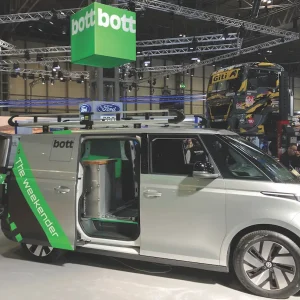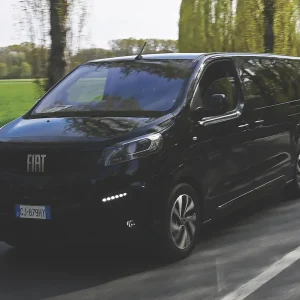After a few false starts, cynicism and apathy from the industry as a whole, the new car market is gradually accepting that the concept of alternative-fuel vehicles (AFVs) is viable and credible.
But when it comes to light commercial vehicles, the outlook is slightly different.
In terms of electric power, both Renault and Nissan have made significant inroads, but registrations have still been modest, and Government ‘plug-in’ grants have failed to lure van operators who still have major concerns regarding range and reduced payloads.
Vans powered by compressed natural gas (CNG) are available from some brands, but the lack of a refuelling infrastructure has generally restricted sales to fleet operators with their own in-house facilities. On top of that, as Alex Wright, MD of Shoreham Vehicle Auctions, suggests there have been concerns about safety, and he would remind a potential buyer they would, for example, be prohibited from travelling in the Channel Tunnel.
Electric hybrid vans, meanwhile, have yet to be developed, although Ford is trialling a number of Transit Custom PHEVs (plug-in hybrid electric vehicles) in London. So from a used perspective there is still very little choice for potential buyers, and AFVs are a rare sight either at auction or on the forecourt.
Despite that, James Davis, commercial vehicle director at Manheim Remarketing, is positive about the outlook: “We have sold more than 30 electric vans since they started appearing in the wholesale market, and also see LPG [liquefied petroleum gas] and CNG product occasionally.
While buyers at large still prefer technology with which they are familiar, more end-users are now considering electric vans, not only because of running costs, but due to the increased focus on – particularly diesel – emissions.”
BCA’s commercial vehicles operations director Duncan Ward, however, takes a less rosy view: “Our experience suggests that while there are benefits for the first owner who wants to be seen to be green, these don’t necessarily translate so well into the used market. What incentives are there for the average self-employed tradesman or small business to choose electric?
“Diesel or petrol vans are reliable, efficient, available in large numbers and have a heritage for ‘doing the job’,” he continues. “Electric vans are perceived as being ‘complicated’, with lots of unknowns in terms of servicing, battery life, range and reliability. Generally, the used buyer wants a reliable cost-effective transport solution for their business, not to make statements about their green credentials.”
He also raises another concern for those businesses that impose an EV on their staff, saying that a lack of engagement can be a real problem, with some drivers simply not taking to the electric driving experience.
Andy Picton, chief commercial vehicle editor at Glass’s, agrees with Ward’s assertion that range anxiety is a big issue, and points out that the fact that the range being quoted by manufacturers is for an unladen vehicle makes the figure irrelevant anyway.
However, Davis counters: ‘While a fully laden electric van will obviously not achieve the same range as an unladen one, the same is true of any diesel van with reference to its fuel economy.”
Range anxiety is also gradually being addressed as the technology becomes better, as Andy Brown, managing director of CD Auction Group, highlights: “Until the infrastructure for recharging is strengthened, range anxiety is always a concern for the ultimate buyer. [But] things are improving as the range available on a charge increases.
“However,” he adds, “the newer vehicles with improved range take time to feed through into the used market.” Davis thinks that for the right operation a used electric model could be an ideal solution. He says urban operations are “the sweet spot” and cites the Nissan e-NV200 with its unladen range of over 100 miles as having an adequate potential for a day’s work.
“Electric vans should cost less to maintain than internal combustion engine equivalents, with some manufacturers stating a positive difference of up to 40%,” he adds.
When considering an electric vehicle our industry experts unanimously agree that a battery history is paramount.
Martin Potter, group operations director of Aston Barclay, says it is vital that documentation is available for inspection and that clarification is sought as to whether the batteries are subject to a separate lease agreement (often the case with Renault Kangoo). Davis concurs, adding buyers should check for the presence of a charging cable, but he also makes an important observation regarding vehicle warranty.
“Depending on whether the van has a manufacturer-approved conversion will dictate if the balance of the warranty will still be in place or whether an alternative warranty is available,” he says.
Meanwhile, Glass’s Picton adds that used vans without any sort of battery ‘health check’ do not perform well in the used market, as essentially they are being “sold as seen”. For trade buyers to become more involved, they will need a more robust level of interest from the retail buyer, says Aston Barclay’s Potter.
“Any investment in EVs by the trade will be driven by retail buyer confidence in the technology and the potential to save money (particularly in cities),” he says. “As this increases, the trade will become more receptive to purchasing EVs for stock.”
Brown of CD Auctions says that initially the trade were prepared to take a risk, but some had their fingers burnt. “The subsequent experience of longer-than-usual days to sell, due to limited interest, has made them far more wary, and buying for specific customer requirements is much more prevalent now,” he explains.
BCA’s Ward takes a similar view, saying that although attitudes vary, with some larger retailers buying for stock, most vehicles are bought to fulfil a customer order. Meanwhile, Wright of Shoreham Vehicle Auctions, puts an onus on the used retailer to qualify the customer correctly in order to maximise sales: “Understanding the technology and the range limitations will help dealers to sell individual models to buyers looking for an electric or hybrid LCV, for a specific use. At this stage, buyer confidence in purchasing from trusted retailers is paramount.”
As for the long-term future of AFVs, Davis is looking on the bright side: “We are very positive about the future for alternatively fuelled vans, particularly electric vans.
Many European cities are introducing ever more stringent emissions limits.
The London Congestion Charging zone is already based on emissions levels, and the mayor of London has been consulting industry on an Ultra-Low Emission Zone (ULEZ) in the city. The charges alone could make electric vans a no-brainer, and diesel vans could even be banned from certain areas at certain times, giving an electric van operator far more flexibility.”
What to look out for when buying a used electric LCV…
Battery history. Study all documentation carefully and see if the vehicle offers an onboard condition check through the instrument panel.
Warranty. Is there one and are there any special terms surrounding the batteries?
Battery title. Ensure the batteries are not tied to a separate lease. If so, what are the terms, conditions and charges?
Charging leads. Make sure these are present.
Useable range. Check that it’s adequate for the daily operation.
Local dealer. Is there a local main dealer who is qualified to repair and service the vehicle?
Protecting residuals
Andy Picton, chief commercial vehicle editor at Glass’s, thinks manufacturers need to be proactive in protecting the residual value of the products: “The ideal scenario would be for the used buyer to purchase from a main dealer franchise where the vehicle would have been properly prepped and will have the backing of the remainder of the manufacturer’s warranty, supported with a ‘health check’ listing battery usage and life remaining.
There are a few used examples floating around on the open market, but these don’t tend to perform strongly as these will be ‘bought as seen’ with no guarantees attached and to many, it is still seen as an unknown technology.”





